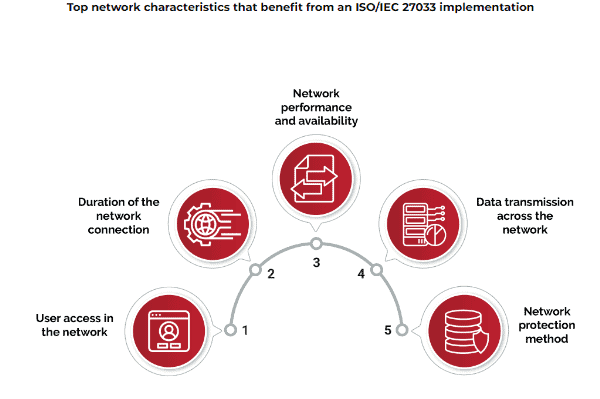ISO/IEC 27033 Network Security – Training Courses
What is Network Security?
The ISO/IEC 27033 series of standards consist of six parts designed to ensure network security of devices, applications, services, and end users. It covers securing communications between networks using security gateways, virtual private networks (VPNs), and wireless IP network access.
ISO/IEC 27033-1 is a mapping to the other parts. It provides an overview of the concepts and management guidance of network security by helping organizations identify and analyze network security risks and network security requirements.
ISO/IEC 27033-2 provides guideline on planning, designing, implementing, and documenting network security. It introduces the network security architecture, its requirements, and the design principles.
ISO/IEC 27033-3 illustrates network scenarios and their related threats, design techniques, and control issues. It helps organizations review technical security architecture, design, and security controls.
ISO/IEC 27033-4 provides guidelines on risks, design techniques, and controls of security gateways. It presents security gateways for securing information flows between networks.
ISO/IEC 27033-5 provides guidelines on risks, design techniques, and controls of virtual private networks (VPNs). It helps organizations select, implement, and monitor technical controls needed to connect remote users to networks.
ISO/IEC 27033-6 provides guidelines on risks, design techniques, and controls of IP wireless networks. It helps organizations select, implement, and monitor technical controls needed to secure communication between wireless networks. This part introduces wireless personal area networks (WPANs), wireless local area networks (WLANs), and wireless metropolitan area networks (WMAN).
Why is Network Security important for you?
A network is an essential component of the IT infrastructure which allows electronic communication and sharing of resources using network devices, protocols, services, interconnection, and infrastructure. Compromising any network infrastructure assets can lead to security and privacy breaches in communication.
Network security ensures the operation of the networks by protecting the network infrastructure and preserving confidentiality, integrity, and availability. An effective network security protects business processes.
The ISO/IEC 27033 series can help organizations plan, design, and implement network security by creating a secure environment and protecting virtual networks and physical devices, data, and proprietary information.
The Benefits of Network Security Certification
- Improved network security
- Enhanced protection of information system networks and personal data from unauthorized access
- Reduced number of security incidents and their impacts
- Reduced slow networks and downtime
- Boosted satisfaction of customers and interested parties
- Increased international recognition
PECB are in the process of developing this training course, as such, it is not ready for distribution yet. Please contact us at Support@aggrace.com to get information about the publication date.

How do I get started with ISO/IEC 27033 Training?
PECB ISO/IEC 27033 training courses are part of a global network of qualitative training. They can help expand your professional knowledge and advance your skills in network security. PECB experts will help you with the certification process.
Training Course Overview
ISO/IEC 27033 Lead Network Security Manager training course help participants gain a comprehensive understanding of the concepts, principles, methods, and design techniques used to implement and manage network security based on the ISO/IEC 27033 series of standards.
Why Should You Attend?
Network security protects the network infrastructure and ensures confidentiality, integrity, and availability.
This training course is focused on developing the necessary knowledge to support an organization in effectively planning, implementing, managing, monitoring, and maintaining network security. It provides a comprehensive elaboration of the structure of the ISO/IEC 27033 series of standards, including network security overview and concepts, guidelines for the design and implementation of network security, and reference networking scenarios to securing the communication between networks using security gateways, VPNs, and wireless IP network access.
The training course is followed by the certification exam. If you pass, you can apply for a “PECB Certified ISO/IEC 27033 Lead Network Security Manager” credential, which demonstrates your ability and competence to manage, operate, and use network security controls in information system networks.
Who Can Attend?
- Network security and information security professionals seeking to manage network security
- Managers or consultants seeking to master network security best practices
- Individuals involved in the planning and implementation of the architectural aspects of network security
- Technical experts seeking to enhance their network security knowledge
- Network security expert advisors
Learning objectives
- Gain a comprehensive understanding of the concepts, approaches, methods, and techniques of the implementation and effective management of network security
- Acknowledge the correlation between the ISO/IEC 27033 series of standards and other standards and regulatory frameworks
- Interpret the guidelines of ISO/IEC 27033 series of standards in the specific context of an organization
- Develop the necessary knowledge and competence to support an organization in effectively planning, implementing, managing, monitoring, and maintaining network security
- Acquire the practical knowledge to advise an organization in managing network security by following best practices
Educational approach
- The training course includes essay-type exercises, multiple-choice quizzes, scenario-based quizzes, and examples of network security best practices.
- Participants are encouraged to communicate with each other and engage in discussions when completing quizzes and exercises.
- The exercises are based on a case study.
- The structure of the quizzes is similar to that of the certification exam.
Prerequisites
The main requirement for participation is a fundamental understanding of the ISO/IEC 27033 series of standards and general knowledge of network security concepts.
Course Agenda
Day 1: Introduction to ISO/IEC 27033 series of standards and initiation of network security implementation
Day 2: Network security team, policy, risk management, and documentation management
Day 3: Internet access services, network segmentation, securing network communications using security gateways, VPNs, and wireless IP network access
Day 4: Network security testing, incident management, monitoring, and continual improvement
Day 5: Certification exam
Examination
The “PECB Certified ISO/IEC 27033 Lead Network Security Manager” exam meets the requirements of the PECB Examination and Certification Program (ECP). It covers the following competency domains:
Domain 1: Fundamental principles and concepts of network security
Domain 2: Network security planning
Domain 3: Network security policy and documentation management
Domain 4: Securing network communications based on ISO/IEC 27033 series of standards and best practices
Domain 5: Network security competence, training, awareness, and team
Domain 6: Network security incident management and business continuity
Domain 7: Network security testing, monitoring, and continual improvement
For specific information about exam type, languages available, and other details, please visit the List of PECB Exams and the Examination Rules and Policies.
Certification
- After successfully passing the exam, you can apply for one of the credentials below. You will receive the certificate once you comply with all the relevant requirements.
For more information about ISO/IEC 27033 Lead Network Security certifications and the PECB certification process, please refer to the Certification Rules and Policies.
The requirements for PECB ISO/IEC 27033 Lead Network Security Manager certifications are as follows:
Credential Exam Professional experience NSMS project experience Other requirements PECB Certified ISO/IEC 27033 Provisional Network Security Manager PECB Certified ISO/IEC 27033 Lead Network Security Manager exam, or equivalent None None Signing the PECB Code of Ethics PECB Certified ISO/IEC 27033 Network Security Manager PECB Certified ISO/IEC 27033 Lead Network Security Manager exam, or equivalent Two years (one in network security) 200 hours Signing the PECB Code of Ethics PECB Certified ISO/IEC 27033 Lead Network Security Manager PECB Certified ISO/IEC 27033 Lead Network Security Manager exam, or equivalent Five years (two in network security) 300 hours Signing the PECB Code of Ethics PECB Certified ISO/IEC 27033 Senior Lead Network Security Manager PECB Certified ISO/IEC 27033 Lead Network Security Manager exam, or equivalent Ten years (seven in network security) 1,000 hours Signing the PECB Code of Ethics The network security project experience should follow the best implementation and management practices and include the following activities:
- Implementing network security
- Managing network security implementation
- Managing documented information
- Monitoring the network security performance
- Managing a network security team
General Information
- Certification and examination fees are included in the price of the training course
- Participants will be provided with the training course material containing over 450 pages of explanatory information, examples, best practices, exercises, and quizzes.
- An attestation of course completion worth 31 CPD (Continuing Professional Development) credits will be issued to the participants who have attended the training course.
- In case candidates fail the exam, they can retake it within 12 months from the initial attempt for free.







